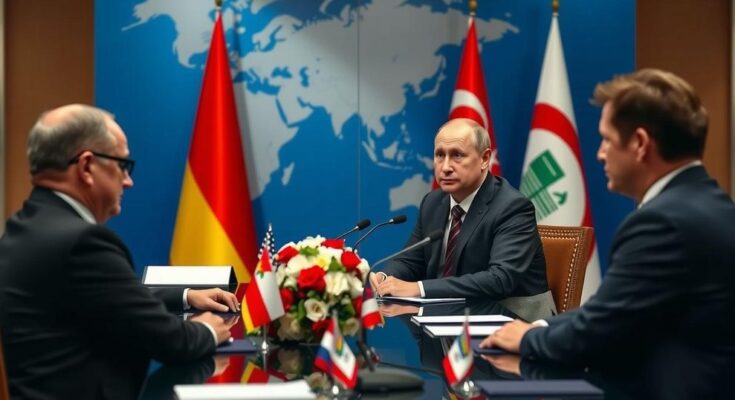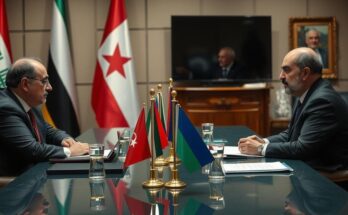Russian President Vladimir Putin presided over a significant BRICS summit in Kazan, aimed at enhancing the bloc’s influence against Western dominance. The summit addressed financial cooperation, established new member states, and underscored the need for strategies to counteract unilateral Western sanctions. Key discussions included the formation of alternative payment systems to navigate existing global financial frameworks. Leaders highlighted a commitment to address regional conflicts and foster greater collaboration among developing economies amidst ongoing geopolitical tensions.
Russian President Vladimir Putin presided over the closing session of the BRICS summit in Kazan, emphasizing the bloc’s role as a counterweight to perceived Western dominance. The leaders of member nations, including China’s Xi Jinping and India’s Narendra Modi, convened to discuss strengthening financial cooperation amongst developing economies, particularly alternatives to Western payment systems and solutions for regional conflicts. The summit witnessed a significant representation of 36 countries, illustrating the diminishing effectiveness of U.S. efforts to diplomatically isolate Russia following its actions in Ukraine. Putin criticized the West for employing what he termed “perverse methods” to suppress the Global South, including sanctions and protectionist measures, while asserting that BRICS aims to foster a more equitable international order. The BRICS alliance has expanded since its inception, adding new members such as Iran, Egypt, and Saudi Arabia, with further interest from several other countries. The summit underscored the urgency for a reformed global financial architecture that prioritizes inclusivity and collaboration among developing nations.
The BRICS summit represents a strategic gathering of emerging economies originally formed by Brazil, Russia, India, China, and South Africa in 2009. Over the years, it has evolved to include additional nations in response to the increasing demand for a multipolar world that challenges Western hegemony. The context of the current summit, hosted by Russia amidst ongoing geopolitical tensions, is critical to understanding the aspirations of these nations to reshape global economic frameworks and to assert their place on the world stage. The summit’s discussions are particularly significant against the backdrop of the ongoing conflict in Ukraine and the implications it has on global security and international relations. By advocating for alternatives to Western financial systems, BRICS aims to bolster its collective influence and provide a counterpoint to U.S.-led initiatives.
In conclusion, the BRICS summit in Kazan highlighted the bloc’s growing influence as a pivotal player in international relations, particularly in the face of Western pressures. With an emphasis on financial independence and political cooperation, the discussions reflect a concerted effort by these nations to challenge existing global power dynamics. The summit’s outcome, marked by a collective desire to establish alternatives to Western-dominated frameworks, signifies a potential shift in the geopolitical landscape, underscoring the significance of collaboration among emerging economies in navigating contemporary challenges.
Original Source: apnews.com




